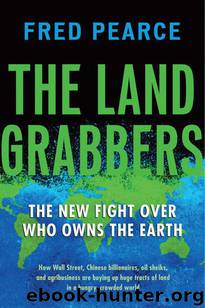The Land Grabbers: The New Fight over Who Owns the Earth by Pearce Fred

Author:Pearce, Fred [Pearce, Fred]
Language: eng
Format: epub, azw3
Publisher: Random House Inc Clients
Published: 2012-05-28T18:30:00+00:00
Eka Tjipta Widjaja was born Oei Ek Tjhong. He emigrated from China to Sulawesi in Indonesia with his family at the age of nine. He started in business selling cookies and other baked goods from a bicycle rickshaw. Later he sold provisions to Indonesian troops across the far-flung Indonesian archipelago. He founded his industrial company, today called Sinar Mas, in 1962. As it grew, it acquired paper and pulp mills, oil-palm plantations, banks, chemical works, and huge land concessions.
Sinar Mas’s biggest subsidiary, in charge of Widjaja’s pulp and paper business, is Asia Pulp and Paper. APP has logged forests from Yunnan in China to Cambodia to the Indonesian side of the island of New Guinea. But its biggest operation is in the forests around its huge mill in Sumatra. Since the mid-1990s, APP has been responsible for destroying more than 2 million acres of Sumatra’s rain forests.
Widjaja, named Indonesia’s richest man in 2011, is flamboyant, famously wearing a belt buckle that spells out his first name, Eka, in diamonds. He is also a dynastic patriarch. He has more than a dozen wives and at least forty children, several of whom have taken top jobs inside his growing corporation. APP, like its owner, has a cowboy reputation. It has been convicted of illegal logging in several countries. An American researcher writing in the Asian Times concluded in 2004 that “APP’s business model is a tactically aggressive one: it turns huge profits by quickly stripping forests bare, exploiting age-old forests and indigenous peoples, and leaving town before the environmental consequences are felt. By the time communities and governments lodge complaints and lawsuits, APP has divested itself of local interests and assets.”
Well, that is sometimes true. But in Sumatra, buoyed by strong political connections, APP seems to be in for the long haul. And that looks like bad news for the locals. For where they have objected to the takeover of their land, the company’s response has often been ruthless.
Take the activities of one of Sinar Mas’s logging subsidiaries, Arara Abadi. It operates in a part of Riau known as Siak, a former sultanate from the days before Suharto. In the late 1990s, Arara Abadi was under intense pressure to keep the new mill supplied with timber. According to the NGO Human Rights Watch, it moved its chainsaws unannounced onto land occupied by indigenous Sakai and Malay families, who practiced shifting cultivation as well as tapping local rubber and collecting rattan and forest fruits.
Usually people slink away when the loggers arrive. But the Sakai felt unusually sure of their rights. The Sultan of Siak had acknowledged their traditional claim to the land and given them formal title in 1940—a fact acknowledged on post-independence state maps. State officials had ignored this when in 1996 they handed over 250,000 acres of forest around the village as a logging concession to Arara Abadi. Since then, the company had been trying to evict the villagers, with the help of local police—who were no doubt grateful that the company had recently built them a new police station in the district capital.
Download
The Land Grabbers: The New Fight over Who Owns the Earth by Pearce Fred.azw3
This site does not store any files on its server. We only index and link to content provided by other sites. Please contact the content providers to delete copyright contents if any and email us, we'll remove relevant links or contents immediately.
Hit Refresh by Satya Nadella(9126)
The Compound Effect by Darren Hardy(8949)
Change Your Questions, Change Your Life by Marilee Adams(7761)
Nudge - Improving Decisions about Health, Wealth, and Happiness by Thaler Sunstein(7693)
The Black Swan by Nassim Nicholas Taleb(7110)
Deep Work by Cal Newport(7066)
Rich Dad Poor Dad by Robert T. Kiyosaki(6612)
Daring Greatly by Brene Brown(6504)
Principles: Life and Work by Ray Dalio(6422)
Playing to Win_ How Strategy Really Works by A.G. Lafley & Roger L. Martin(6250)
Man-made Catastrophes and Risk Information Concealment by Dmitry Chernov & Didier Sornette(6007)
Big Magic: Creative Living Beyond Fear by Elizabeth Gilbert(5756)
Digital Minimalism by Cal Newport;(5750)
The Myth of the Strong Leader by Archie Brown(5500)
The Slight Edge by Jeff Olson(5410)
Discipline Equals Freedom by Jocko Willink(5379)
The Motivation Myth by Jeff Haden(5205)
The Laws of Human Nature by Robert Greene(5177)
Stone's Rules by Roger Stone(5081)
